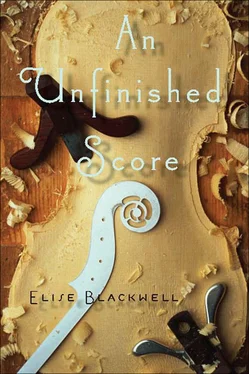The first piece was an appalling exaggeration of serial music. The composer played electric violin and was accompanied by a dancer of sorts — the program called him a movement artist — encased in black leggings and turtle-neck. Summoning her natural compassion for any performer, the empathy borne of kinship, she kept her eyes forward, afraid that her smile might turn to laughter if she glanced at Alex. To make time pass, she counted the ratio of heads to empty chairs in the rows in front of them: the theater was not quite half full.
The beginning of the main fare suggested something better. The composer-pianist had broken apart Bartók’s piano sonatas, filling in the spaces with his own measures. The music was beautiful and made new, as though the composer had cracked open a geode, separating the sparkly, faceted pieces, revealing something previously hidden. But then the silent woman standing near him onstage made a circle of her mouth and let out a chilling note before chanting in a strangely high monotone: a poem by Wallace Stevens, word by slow word. She could imagine Ben, an opera hater who believed that words and music were incompatible, noncomplementary languages, standing indignantly and huffing from the room before the chanter made it through the poem’s first stanza. She felt Alex, who usually sat preternatu-rally still at concerts, flinch in the seat beside her, a spontaneous aversion he covered by switching the cross of his legs, folding his arms, sinking back further in his chair as though anxious for an extra inch between him and the horror on stage.
The reception was held on the second floor of the same building, in a large conference room whose burgundy, blue, and rose paisley carpet belonged in a movie-theater lobby. The swirling patterns and the quick glass of inexpensive champagne tilted Suzanne’s perception, and she felt ill at ease as the room filled. She skirted its circumference, sampling warm grapes and cheese and miniature quiches, hoping the food would serve as ballast. She determined to be happy and charming, to be what Alex wanted her to be, to be the woman he had flown from Chicago to be with.
When she felt a little better, and when enough time had passed that she and Alex could slip away, she found his head among the crowd and wove her way to the center of the room, where he was talking to a tall brunette in a red dress. The young woman was pretty in the way that Suzanne had been at twenty-two. Her hair was the same unusual shade of brown, and she had narrow hips and breasts of a certain shape and lift, though she was half a foot taller than Suzanne had ever hoped to be.
Suzanne felt her pulse in her carotid artery, felt fingers of heat climbing her neck, touching her face, which she knew must look red. Jealousy , she named for herself, hoping to douse it by identifying it. She felt low to the ground. She’d worn ballet flats instead of heels because of the long walk, but now she had blisters on the backs of her heels anyway. She tried to smile.
“I don’t think I ever understood that poem until today,” the young woman was telling Alex.
The comment would ordinarily have infuriated Alex, but instead of walking away, instead of soliciting Suzanne as a mocking conspirator, he discussed the poem and delivered trivia about Stevens. He was smiling more than usual — it was something he usually forgot to do — and smoothing his hair with his free hand the way he had those first few times he’d spoken to Suzanne. She’d been warned right away, by one of the bassists in St. Louis, about Alex’s reputation as a womanizer.
Alex turned to her now. “And what did you think of the Bartók?”
Suzanne wanted desperately to say something smart, but her mind felt wavy. She tried to assemble a sentence to explain how she felt the composer had cracked open the sonatas to find something new and beautiful inside.
“But the poem,” the tall young woman said. “Don’t you think that’s where the real innovation lies? Anyone can do deconstruction.”
Her pulse still throbbing in her neck, Suzanne reached for something to say. “I think words and music are incompatible, noncomplementary languages.”
The woman laughed, tossing her hair behind her shoulder in a move that elongated the triangle between them, bringing her closer to Alex and making Suzanne the outlier. “It seems we’re not in the presence of an opera fan.”
Suzanne took two steps back, then turned away, murmuring to be excused.
“But perhaps a fan of yours,” she heard the young woman say.
Fifteen minutes later Alex found her sitting on a bench at the side of the empty lobby downstairs. He was buoyant as he said, “I’ve been looking for you.”
“Not very hard,” she whispered.
“What are you talking about?”
She shrugged. “Let’s go, okay?”
He held open the door for her as they walked out to find dusk settling. She didn’t intend to, but when he put his arm around her bare shoulders, she condensed into herself. He dropped his arm and stepped in front of her, blocking her. “What’s wrong?”
“I feel like I can’t say anything about music to you, and then there you are pretending to like the concert.”
“What are you talking about?” His voice lifted, his father’s accent angling into his words. “I always ask your opinion about music, and I’m pretty sure we both thought that concert was about as bad as it gets.”
“But you were telling that woman otherwise.”
“Don’t be jealous. Don’t do that.”
“It’s hard to imagine you’d let her comment pass without a sneer if she wasn’t young and pretty.” Suzanne tried to step around him, but he held her shoulders tight with both hands. Her throat constricted as she softly croaked, “You let her make fun of me as though I wasn’t even there.”
“She’s a stupid girl. Stupid and pretentious. And I was ‘letting her comment pass’ because her father happens to be a philanthropist with a love of classical music. If you haven’t noticed, it takes money to run an orchestra. A whole fucking lot of money. Would you even have been interested in me if I wasn’t successful?” He dropped his grip on her shoulders and spun to the street, hailing a cab. “I can’t believe this.”
Two taxis passed before one stopped. In the back of the cab, Alex glared down his nose at her, then out the window, then back at her while the cab driver tried to make a left turn through heavy pedestrian traffic.
“Can’t you just drive around the block?” Alex yelled at the man.
“Almost got it, sir.”
“I’m sorry,” Suzanne said, her mouth heavy with silent crying. “But it was a fair response.”
“What the hell do you think I’m doing here? You think I flew to New York to see that crap? Or was it for the disgusting finger sandwiches?”
“I just want to be sure you’ll tell me if it’s ever over. I don’t want to be pathetic.” She was crying aloud then.
The cabbie made eye contact in the mirror as the car gained speed heading downtown. Out the window the street looked shiny with reflected orange light.
“It wasn’t ever going to be over,” Alex said.
“Wasn’t.” Her throat ached as she spoke. “I just don’t want to be a notch, one of many.”
“The last of many, Suzanne. You were going to be the last of many.” He turned from her, leaning forward, his arm a barrier. “Where are you from?” he asked the driver, cold and steady, as though Suzanne was not in tears, as though she was not in the car at all.
“Haiti,” said the man, “but now New York. I’ve been here a long time.”
Back at Alex’s hotel, Suzanne sat on the bed, contemplating catching the train back to Princeton even though she had made an excuse to be away for the night.
Читать дальше












